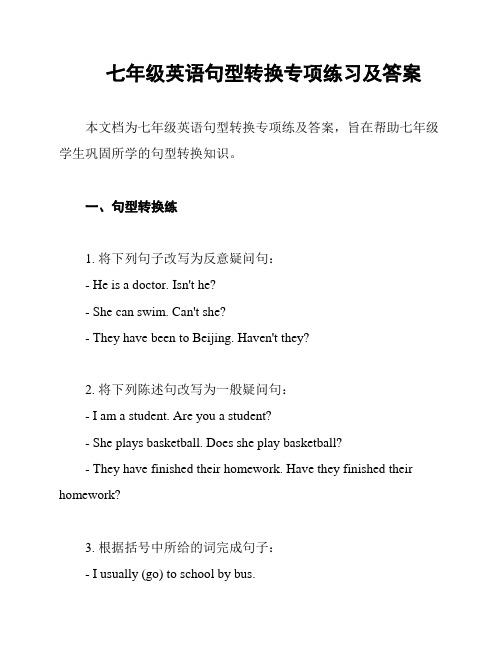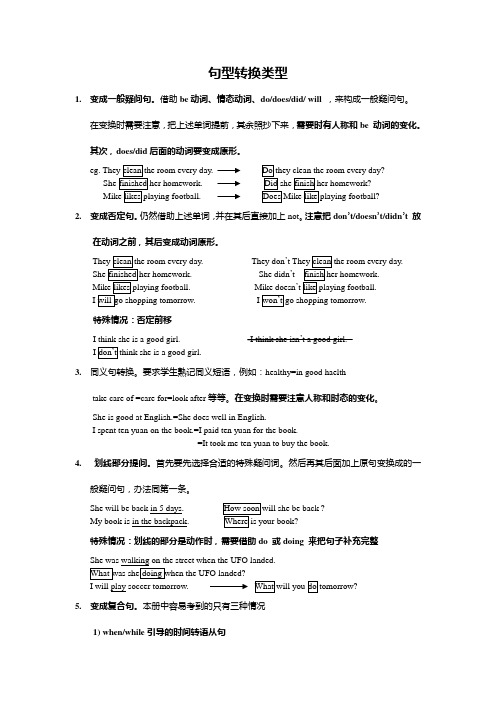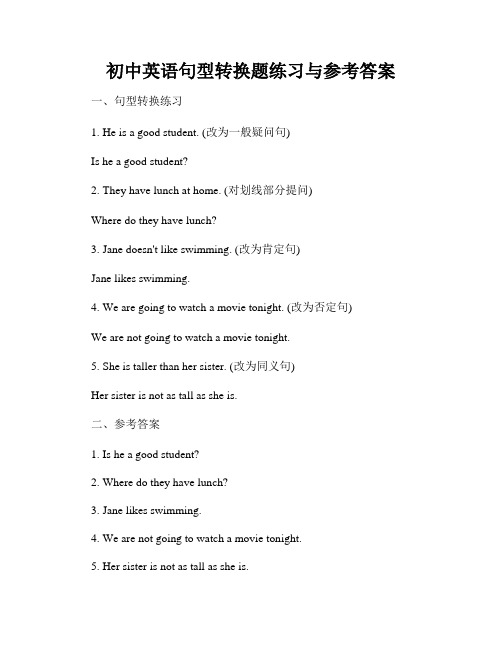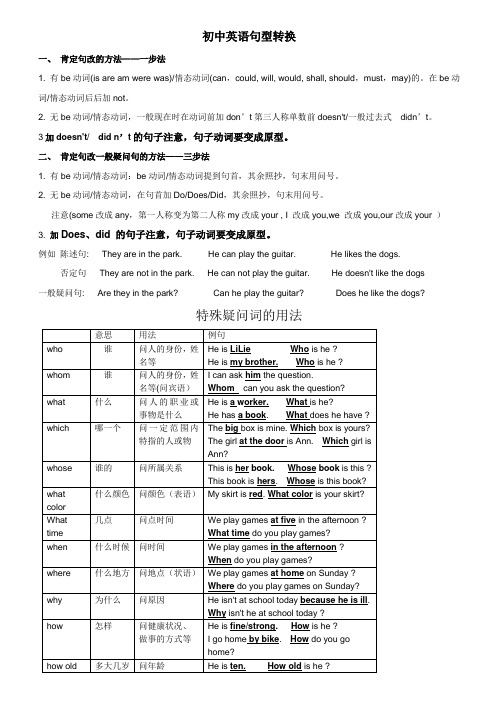初中英语句型转换
初中英语句型转换练习题

初中英语句型转换练习题### 初中英语句型转换练习题#### 一、一般疑问句转换1. 原句:She likes playing the piano.转换:Does she like playing the piano?2. 原句:They are going to the park tomorrow.转换:Are they going to the park tomorrow?3. 原句:He has finished his homework.转换:Has he finished his homework?#### 二、特殊疑问句转换1. 原句:She is a teacher.转换:What does she do?2. 原句:We will have a meeting at 3:00 PM.转换:When will you have a meeting?3. 原句:They went to the beach last weekend.转换:Where did they go last weekend?#### 三、陈述句转换为一般疑问句1. 原句:The movie starts at 7:00 PM.转换:Does the movie start at 7:00 PM?2. 原句:He can speak three languages.转换:Can he speak three languages?3. 原句:She is reading a book.转换:Is she reading a book?#### 四、否定句转换1. 原句:He doesn't like swimming.转换:He likes swimming.2. 原句:They aren't going to the concert.转换:They are going to the concert.3. 原句:She hasn't seen the movie.转换:She has seen the movie.#### 五、直接引语转换为间接引语1. 原句:She said, "I will go to the library."转换:She said that she would go to the library.2. 原句:He asked, "Can you help me with my homework?"转换:He asked if I could help him with his homework.3. 原句:They said, "We will visit our grandparents next week."转换:They said that they would visit their grandparents the next week.#### 六、条件句转换1. 原句:If it rains, we will stay at home.转换:We will stay at home if it rains.2. 原句:She will call you if she has time.转换:If she has time, she will call you.3. 原句:They will go to the party unless they are too tired.转换:They will go to the party unless they are too tired. #### 七、祈使句转换1. 原句:Please close the door.转换:Close the door, please.2. 原句:Don't forget to turn off the lights.转换:Remember to turn off the lights.3. 原句:Let's go to the movies.转换:We should go to the movies.通过这些练习题,学生可以加深对英语句型转换的理解和应用能力。
七年级英语句型转换专项练习及答案

七年级英语句型转换专项练习及答案本文档为七年级英语句型转换专项练及答案,旨在帮助七年级学生巩固所学的句型转换知识。
一、句型转换练1. 将下列句子改写为反意疑问句:- He is a doctor. Isn't he?- She can swim. Can't she?- They have been to Beijing. Haven't they?2. 将下列陈述句改写为一般疑问句:- I am a student. Are you a student?- She plays basketball. Does she play basketball?- They have finished their homework. Have they finished their homework?3. 根据括号中所给的词完成句子:- I usually (go) to school by bus.- He (not like) hamburgers.- We (have) a test next Monday.- They (watch) a movie last night.二、答案1. 反意疑问句:- He is a doctor. Isn't he?- She can swim. Can't she?- They have been to Beijing. Haven't they?2. 一般疑问句:- I am a student. Are you a student?- She plays basketball. Does she play basketball?- They have finished their homework. Have they finished their homework?3. 根据括号中所给的词完成句子:- I usually go to school by bus.- He doesn't like hamburgers.- We will have a test next Monday. - They watched a movie last night.。
初中英语句型转换类型总结

句型转换类型1.变成一般疑问句。
借助be动词、情态动词、do/does/did/ will ,来构成一般疑问句。
在变换时需要注意,把上述单词提前,其余照抄下来,需要时有人称和be 动词的变化。
其次,does/did后面的动词要变成原形。
2.变成否定句。
仍然借助上述单词,并在其后直接加上not。
注意把don’t/doesn’t/didn’t 放在动词之前,其后变成动词原形。
They don’She didn’tMike doesn’特殊情况:否定前移I think she is a good girl. I think she isn’t a good girl.3.同义句转换。
要求学生熟记同义短语,例如:healthy=in good haelthtake care of =care for=look after等等。
在变换时需要注意人称和时态的变化。
She is good at English.=She does well in English.I spent ten yuan on the book.=I paid ten yuan for the book.=It took me ten yuan to buy the book.4.划线部分提问。
首先要先选择合适的特殊疑问词。
然后再其后面加上原句变换成的一般疑问句,办法同第一条。
She will be back in 5 days.My book is in the backpack.特殊情况:划线的部分是动作时,需要借助do 或doing 来把句子补充完整She was walking on the street when the UFO landed.I will play soccer tomorrow.5. 变成复合句。
本册中容易考到的只有三种情况1) when/while引导的时间转语从句She was coolong. Mary came home.2) if 引导的条件状语从句(注意主句、从句使用的时态不同)有or, if 引导的用否定)Work hardIf you work hard, you will pass the exam. (有and, if 引导的用肯定)3)直接引语变成间接引语。
初中英语句型转换题练习与参考答案

初中英语句型转换题练习与参考答案
一、句型转换练习
1. He is a good student. (改为一般疑问句)
Is he a good student?
2. They have lunch at home. (对划线部分提问)
Where do they have lunch?
3. Jane doesn't like swimming. (改为肯定句)
Jane likes swimming.
4. We are going to watch a movie tonight. (改为否定句)
We are not going to watch a movie tonight.
5. She is taller than her sister. (改为同义句)
Her sister is not as tall as she is.
二、参考答案
1. Is he a good student?
2. Where do they have lunch?
3. Jane likes swimming.
4. We are not going to watch a movie tonight.
5. Her sister is not as tall as she is.
注意:以上参考答案仅为参考,实际上可能会有多种正确的表达方式。
句型转换题的关键在于理解句子的结构和语法规则,根据题意进行必要的改变。
希望以上内容对你有所帮助。
中考英语丨初中英语句型转换大全

中考英语丨初中英语句型转换大全展开全文一、陈述句与疑问句、祈使句、感叹句间的转换1、陈述句中肯定句变为否定句,大部分是用not来改变谓语结构,但也有借用否定意义的词,如nothing, nobody, none, neither, little, few, never, hardly等,例如:A:T om does well in maths.B:Tom doesn't do in maths.A:He has much to do.B:He has nothing to do.A:All of my classmates like art.B:None of my classmates likes art.2、改为疑问句。
根据上下句的结构和词的减少,来判断变为哪一种形式的疑问句。
例如:A:My brother often has breakfast at school.B: Does your brother often have breakfast at school?A:T om's already weak in English.B:Tom's already weak in English, isn't he ?A:The red light changes every two minutes.B:How often does the red light change?3、改为感叹句。
根据所给的句子结构和单词的词性,来确定使用哪一种感叹句的形式,例如:A:This is an interesting book.B:What an interesting book this is!或 How interesting this book is!二、同义句转换。
根据上句,写出一个意思相同(或相近)的下句,此类形式繁多,内容复杂,涉及面广,归类如下:1、同义词或词组之间的转换。
初中英语句型转换(陈述句变一般疑问句特殊疑问句及练习)

3 加 doesn't/ did n’t 的句子注意,句子动词要变成原型。
二、 肯定句改一般疑问句的方法——三步法
1. 有 be 动词/情态动词:be 动词/情态动词提到句首,其余照抄,句末用问号。
2. 无 be 动词/情态动词,在句首加 Do/Does/Did,其余照抄,句末用问号。
注意(some 改成 any,第一人称变为第二人称 my 改成 your , I 改成 you,we 改成 you,our 改成 your )
My book is over there. Whose book is over there ?
主语的定语 主语 谓语
疑问词 主语 谓语
以上两点方法都是:
用正确的疑问词代替画线部分,再把句号改为问号,其余部分一般不做改变
3.对表语或宾语的定语部分提问,其语序是:
疑问词+表语或宾语(画线部分所修饰的名词)+一般疑问句(省略画线部分和它所修饰的名词)
一般疑问句: Are they in the park?
Can he play the guitar?
Does he like the dogs?
综合练习: 1. The children have a good time in the park. 否定句:___________________________________ 一般疑问句:___________________________________ 2. There are about nine hundred people at the concert.(音乐会) 否定句:_________________________________ 一般疑问句:________________________________________ 对划线部分提问:____________________________________ 3. There is only one problem. 否定句:_____________________________________ 一般疑问句:________________________________________ 肯定/否定回答:____________________________________ 4. Ann does her homework every evening. 否定句:__________________________________________ 一般疑问句:________________________________________ 对划线部分提问:____________________________________ 5. I read an English book every day. 否定句:__________________________________________ 一般疑问句:________________________________________ 肯定/否定回答:____________________________________ 对划线部分提问:____________________________________ 6. My brother is in the park now. 否定句:____________________________________ 一般疑问句:________________________________________ 肯定/否定回答:__________________________ 对划线部分提问:____________________________________ 7. She has some bread for lunch today. 否定句:__________________________________________ 一般疑问句:_________________________________ 肯定/否定回答:____________________________________ 8. They read English every day. 否定句:___________________________________ 一般疑问句:________________________________________ 肯定/否定回答:____________________________________ 对划线部分提问:____________________________________
初中英语句型转换篇
初中英语句型转换篇(一)、肯定句改为否定句的方法【一步法】1. 有be动词(is are am were was)/情态动词(can,could, will, would, shall, should,must,may)的。
在be动词/情态动词后后加not。
2. 无be动词/情态动词:一般现在时:第一、二人称单数的句子在动词前加don’t;第三人称单数的句子在动词前加doesn't一般过去:通通在动词加didn’t★注意要点1. 加doesn't/ did n’t的句子注意,句子动词要变成原型。
2. Some变成any★经典练习把下列句子变成否定句1. I am listening to music. _______________________________________2. Tom likes listening to music ________________________________________3. Sarah can clean the classroom. ________________________________________4. I put a book on my head. ________________________________________5. There were some flowers in the vase. ________________________________________6. We play basketball on Sundays. _______________________________________7. I go to see my parents once a month. _______________________________________8. She needs some masks. _______________________________________9. They like making the puppet. _______________________________________10. Su Hai and Su Yang lived in a new house._______________________________________(二)、肯定句改一般疑问句的方法【三步法】★方法1. 有be动词/情态动词:be动词/情态动词提到句首,其余照抄,(some改成any,第一人称变为第二人称my改成your , I 改成you,we 改成you,our改成your )句末用问号。
初中英语句型转换练习2
初中英语句型转换练习2语法笔记十五(一)句子中含be或者情态动词时,在be或者情态动词后面直接加上not. 例:I am a middle school student now. I am not a middle school student now.He can make a robot. He cannot (can’t) make a robot.His father is mending his car now. His father isn’t mending his car now. (二)句子中含实意动词时,先找助动词,在助动词后面添not,其它成分照抄,若原句中动词有变化,则动词要还原成原形。
do/doesdid, 例:He goes to school on foot every day. Does he go to school on foot every day?My teacher went to the concert last night. Did your teacher go to the concert last night?注意:在变否定句的时候some要变成any例:Mary will buy some apples for her mother soonMary won’t buy any apples for her mother soon.(三)祈使句否定形式在句首直接加not例:Sit down. Don’t sit down.(一)句子中含be或者情态动词时,将be或者情态动词提到句首,其它成分照抄。
例:His friend is in the room now. Is his friend in the room now?Jack can run very fast. Can Jack run very fast?(二)句子中含实意动词时,先找助动词,将助动词提到句首,,若原句中动词有变化,则。
初中英语句型转换(附答案)
句型转换1.Why don’t you ask your teacher for help when you are in trouble?(改为同义句)______ _______ask your teacher for help when you are in trouble?2.I used to get up early in the morning.(改为一般疑问句)______you ________to get up early in the morning?3.If you work hard, you’ll catch up with your classmates.(改为祈使句)_________ ________, and you’ll catch up with your classmates.4.I think we should stay at home to do our homework tonight.(改为否定句)I _______ _________ we should stay at home to do our homework tonight.5.The Japanese girl can hardly sing a Chinese song.(改为反意疑问句)The Japanese girl can hardly sing a Chinese song, ________ _________?6.The teacher allowed the students to go to see the movie.(改为被动语态)The students________ _________ to go to see the movie.7.My boss has been to Hong Kong twice a month.(对划线部分提问)_________ ________ has your boss been to Hong Kong?8.We study English very hard.(改为感叹句)_______ _________we study English!9.Does Jenny like dancing? Can you tell me?(合并成含有宾语从句的复合句)Can you tell me ________Jenny_________ dancing?10.The girl with some flowers in her hand is my sister.(改写成含有定语从句的复合句)The girl ________ ________some flowers in her hand is my sister.11.There are some books on the desk.(改为否定句)There _________ _________ books on the desk.12.He doesn’t know what he should do.(改为简单句)He doesn’t know________ _________do.13.I spend an hour in reading English every day.(改为同义句)It _________ me an hour ________read English every day.14.Let’s play together.(改为反意疑问句)Let’s play together, ___________ __________?15. “Where are you going to spend your holiday?” he asked her.(改为复合句)He asked her __________ she _________ going to spend her holiday.16.Tony studies maths very hard in our class.(改为感叹句)_________ __________ Tony studies maths in our class!17.He is good at physics, and he can work out the difficult exercise.(改为同义句)He ___________ __________ in physics, and he can work out the difficult exercise. 18.There is little milk in the bottle.(改为反意疑问句)There is little milk in the bottle, __________ __________?19.We can hear the girls singing in the next room.(改为被动语态)The girls can __________ ___________singing in the next room.20.Lucy will finish writing an e-mail in half an hour.(对划线部分提问)__________ _________ will Lucy finish writing an e-mail?21.There are some oranges in the basket.(改为一般疑问句)________ there __________ oranges in the basket?22.The boy is too young to go to school.(同义句)The boy is _________ young _________ he can’t go to school.23.Let’s go to the zoo.(反意疑问句)Let’s go to the zoo, _________ _________?24.I don’t know what I should do.(改为简单句)I don’t know what __________ ___________.25.I think Mr. Zhang is ill in hospital.(否定句)I _________ think Mr. Zhang _________ill in hospital.26.He has never been to Beijing.(反意疑问句)He has never been to Beijing, __________ _________.27.They are very excited.(感叹句)_________ _________ they are!28.We planted a lot of trees in the village last year.(改为被动语态)A lot of trees __________ __________ in the village last year.29.I’ve been learning English since 2003.(对划线部分提问)__________ _________ have you been learning English?30.I don’t like coffee. He doesn’t like coffee, either.(合并为一句)__________ I _________ he likes coffee.31.She is a woman teacher. (改为复数形式)They are ___________ _________.32.The twin needs some bananas.(改为否定句)The twin ___________ need _________bananas.33.You mustn’t throw anything at the animals when you are in the zoo.(改为祈使句)_________ __________ anything at the animals when you are in the zoo.34.The Changjiang River is the longest river of China.(用Yellow River改为选择疑问句)_________is the longest river of China, the Changjiang River _________the Yellow River?35.I don’t think you can finish it on time.(改为反意疑问句)I don’t think he can finish it on time, ____________ ___________?36.The river is 10 meters wide.(对划线部分提问)__________ ___________ is the river.37.Not only Tom but also Bob has been to that island.(改为同义句)_________ Tom and Bob _________ been to that island.38.I sent a letter to you last month.(改为被动语态)A letter __________ _________ to you last month.39.Your living-room is very bright.(改为感叹句)__________ _________ your living-room is!40.Does the earth go around the sun? My son asked the teacher.(合并为宾语从句)My son asked the teacher _________ the earth __________ around the sun.41.We had a great time yesterday.(改为感叹句)_________ _________ great time we had yesterday!42.The book cost me five yuan.(改为同义句)I _________ five yuan _________ the book.43.The problem is so hard. I can’t work it out.(合并为简单句)The problem is __________hard for me ___________work out.答案:1.Why not 2.Did, you 3.Work; hard 4.don’t think 5.can she 6.were allowed 7.How often 8.How hard 9.if/wether ;likes 10.who/that, has/holds 11.aren’t any 12.what, to 13.takes; to 14.shall we 15.where; was 16.How hard 17.does well 18.is there 19.be heard 20.How soon 21.Are; any 22.so; that 23.shall we 24.to do 25.don’t is 26.has he 27.How excited 28.were planted 29.How long 30.Neither nor 31.women teachers 32.doesn’t any 33.Don’t throw 34.Which or 35.can he 36.How wide 37.Both have 38.was sent 39.How bright 40.if/whether went 41.What a 42.spent on 43.too to。
初中英语句型转换题
初中英语句型转换题一、肯定句改否定句1、在动词前面加don’t或doesn’t。
例如: I(don) like math. →I don’t like math.2、在动词后面加not。
例如: I(can) speak French. → I can’t speak French.3、有be动词的,在be动词后面加not。
例如: She(is) a student. → She isn’t a student. They(are) friends. → They aren’t friends.4、有情态动词的,在情态动词后面加not。
例如: I(can) go there. → I can’t go there.二、一般疑问句和否定句的转换1、在助动词前面加didn或助动词的倒3时,如果句中有am,则把am改成are。
如:I(am) a student. → Are you a student? You(have)a bike. → Do you have a bike?2、肯定回答:Yes,主语+助动词/情态动词/be动词。
否定回答:No,主语+助动词/情态动词/be动词 not。
如:—Are you a student?—Yes,I am./No,I am not.3、在情态动词或助动词前面加didn或助动词的倒3时,如果句中有was,则把was改成were。
如:He(was) here an hour ago. → Were you here an hour ago?4、就一般疑问句提问。
如:He(is) a doctor. → Is he a doctor?They(have) a car. → Do they have a car? We(will) go to school tomorrow. → Will we go to school tomorrow? They(can) swim. → Can they swim?5、就否定句提问。
- 1、下载文档前请自行甄别文档内容的完整性,平台不提供额外的编辑、内容补充、找答案等附加服务。
- 2、"仅部分预览"的文档,不可在线预览部分如存在完整性等问题,可反馈申请退款(可完整预览的文档不适用该条件!)。
- 3、如文档侵犯您的权益,请联系客服反馈,我们会尽快为您处理(人工客服工作时间:9:00-18:30)。
初中英语“句型转换”题归类与指导在英语考试中,“句型转换”题所占分值较大,是为了全面考查学生在初中阶段所学的词汇(同义或反义)、短语、句型和语法等方面的知识及其它的之间的灵活运用能力。
Ⅰ.题型介绍所谓“句型转换”就是先给一个完整的句子A,再根据括号内的要求(有时没有明确,须自己观察),在第二个句子B的空白处填上适当的词来完成的句型转换。
Ⅱ.题型分类从形式上看,有如下几种形式:①某一词或词组的转换;②词组与句子的转换;③同义句型的转换;④为纠正常犯语言错误而设计的题目。
从内容上看,此题型涉及的面较广,主要有:①句子功能方面的转换。
包括陈述句(肯定与否定)、四种题疑问句、祈使句、感叹句的转换;②句子结构方面的转换。
即简单句、复合句、并列句之间的转换;③语态的转换。
即主动语态与被动语态之间的转换;④常用句型与词汇手段的转换。
Ⅲ.具体分类如下一、陈述句与疑问句、祈使句、感叹句间的转换1、陈述句中肯定句变为否定句,大部分是用not来改变谓语结构,但也有借用否定意义的词,如nothing, nobody, none, neither, little, few, never, hardly等,例如::A:Tom does well in maths.B:Tom doesn’t do in maths.A:He has much to do.B:He has nothing to do.A:All of my classmates like art.B:None of my classmates likes art.2、改为疑问句。
根据上下句的结构和词的减少,来判断变为哪一种形式的疑问句。
例如:A:My brother often has breakfast at school.B: Does your brother often have breakfast at school?A:Tom’s already weak in English.B:Tom’s already weak in English, isn’t he ?A:The red light changes every two minutes.B:How often does the red light change?3、改为感叹句。
根据所给的句子结构和单词的词性,来确定使用哪一种感叹句的形式,例如:A:This is an interesting book.B:What an interesting book this is!或 How interesting this book is!二、同义句转换。
根据上句,写出一个意思相同(或相近)的下句,此类形式繁多,内容复杂,涉及面广,归类如下:1、同义词或词组之间的转换。
(通常上下句时态保持一致)。
常见的同义词或词组有:(1)四个“花费”(spend—take—cost—take);(2)三个“到达”(get to—reach—arrivein/at);(3)四个“收到…来信”(hear from—get a letter from—receive a letter from—have a letter from);(4)两个“擅长于…”(be good at —do well in);(5)两个“有空”(be free—have time);(6)三个“入睡”(go to sleep—get to sleep—fall asleep);(7)两个“玩得开心”(enjoy oneself—have a good time);(8)“给…打电话”(call sb—telephone sb—ring sb. a call—make a telephone to sb.)(9)“飞往…”(fly to…—go to…by air/plane)(10)“自学”(teach oneself—learn…by oneself)(11)在…方面帮助help…with…—help… (to)do…(12)在…差be weak in…—do badly in…(13)能/会…can—be able to(14)更喜欢…like…better than…—prefer…to…(15)充满了…be full of…—be filled with…(16)放弃干...give up doing...—stop doing...(17)不再... no longer—not ...any longer(18)照顾/保管take care of...—look after(19)展览 on show—on display(20)阻止...干...stop...from doing—keep/prevent...from doing (21)由于 thanks to—because of…(22)举手hands up—put up one’s hands(23)最后,终于at last—in the end(24)与…不同be different from…—be not the same as…(25)从…借入…borrow…from…—lend…to…(26)乘公汽/火车/的士go to…by bus/train/taxi—take a bus /train/taxi to…(27)乘自行车去… go to…by bike—ride a bike to…(28)为…感到自豪be proud of…—be the pride of…(29)步行去… walk to…—go to…on foot (30)独自地by oneself —alone等。
例如:A:The children had a good time in the park.B:The children enjoyed themselves in the park.2、同义句型之间的转化。
常见的同义句型有①It seems that 从句→Somebody seems(to be)+adj/n ②It’s kind of sb. to do…→Somebody is kind to do… ③What does…mean?→What do you mean by…? 或What’s the meaning of…?④There is something wrong with…→Something is wrong with…⑤not…until…与when/after/before引导的时间状语从句的转换⑥What’s wrong with…?→What’s the matter with…?⑦Howis…?→What’s…like…?⑧How do you like…?→What do you thinkof?⑧It’s time that…→It’s time for sb. to do…⑨It’s said that…→People say that…⑩Can I help you? →What can I do for you?例如:A:I went to bed after I finished my homework.B:I didn’t go to bed until I finished my homework.3、if引导的条件状语从句的转化。
例如:A:If it doesn’t rain tomorrow, they’ll go to the park.B:Unless it rains tomorrow, they’ll go to the park.A:If you don’t hurry, you’ll be late.B:Hurry up, or you’ll be late.A:Fish can’t live if there is no water.B:Fish can’t live without water.4、现在完成时态中的一句多译。
在现在完成时态中,结束性动词不能与时间段连用,必须改成相应的延续性动词。
常见的动词转换有:buy—have, borrow—keep, die—be dead, open—be open, join—be in+组织/be a +成员, begin—be on, leave—be away from, close—be closed, arrive in/ get to/ come/go to—be in/at, finsh—be over, go to sleep—be asleep,get up—be up.例如:The old man died five months ago.The old man has been dead since five months ago.The old man has been dead for five months.It’s five months since the old man died.Five months has passed since the old man died.5、简单句与复合句之间的转换。
①含宾语从句的复合句与简单句的转换。
例如:A:I saw they were playing football on the playground.B:I saw them playing football on the playground.A:The teacher found that she was very clever.B:The teacher found her very clever.A:He found that it was hard to learn English well.B:He found it hard to learn English well.A:We are sure that we will win to first match.B:We are sure to win to first match.由疑问代词/副词引导的宾语从句可转化为“疑问句+不定式”结构。
例如:A:Could you tell me how I can get to the railway station?B:Could you tell me how to get to the railway station?A:We don’t know what we should do next.B:We don’t know what to do next.②由when/after/before/while/since/until引导的时间状语从句可转化为when/after/before/while/sine/until + doin g…例如:A:They went home after they finished their work.B:The went home after finishing their work.A:Mr Smith has taught English since he came to China.B:Mr Smith has taught English since coming to China.When sb. +be+数词+years old→at the age of+岁数A:When he was twelve years old, Edison started writing his own newspaper.B:At the age of twelve, Edison started writing his own newspaper.③由so…that…引导的结果状语从句可转化为too…to do 或…enough to do……例如:A:The box is so hea vy that I can’t carry it.B:The box is too heavy for me to carry.或:The box isn’t light enough for me to carry.A:The child is so old that he can go to school.B:The child is old enough to go to school.④由so that 引导的目的状语从句可转化为in order to do例如:A:My father got up early this morning so that he could catch the early bus.B:My father got up early this morning in order to catch the early bus.⑤由because 引导的原因状语从句可转化为because of…例如:A:We didn’t go to the park because it rained.B:We didn’t go to the park because of the rain.⑥定语从句可以转化为介词短语或分词短语。
